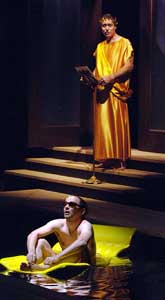-
- Methodist appeals panel reinstates defrocked lesbian minister
- 500 gay-rights supporters protest Focus on Family
- Navajo president vetoes same-sex marriage ban
- Ex-gay counselor invited back onto national advisory panel
- Southwestern Missouri school district plans to lift ban on gay-pride T-shirts
- Microsoft may reconsider its stance on gay rights bill, which failed by one vote
- High court to review law penalizing schools that bar military recruiters
- National News Briefs
- World News Briefs
Arts & Entertainment
The Greeks, the French and human nature
Published Thursday, 05-May-2005 in issue 906
Metamorphoses
Greek myths take us back to the basics of human nature: greed, vanity, doubt, faithfulness, generosity – all both familiar and dramatic.
Playwright Mary Zimmerman, recipient of a MacArthur “genius” grant in 1998, takes Metamorphoses, the epic poem by Roman poet Ovid on themes of Greek myths, and creates an astonishing dramatic piece that holds up a mirror to human nature.
The set is a pool, filled with water that alternately purifies, supports, covers and drowns the characters as they play out their stories. A raised platform behind a suspended upstage canvas painted with clouds serves as the upper realm.
Metamorphoses requires an ensemble cast; Lamb’s Players, with one of the best in town, provides the engine for this production. The play has been extended through May 22 at their theater in Coronado. Robert Smyth directs.
Many of the usual suspects are here (Zeus, Apollo, Midas, Phaeton, Orpheus and Eurydice), as well as some less familiar ones like Alcyone and Ceyx, King Erysichthon, Pomona and Vertumnus, and Myrrha and Cinyra.
Midas (David Cochran Heath) is first up, requesting that everything he touch turn to gold – “a really, really bad idea,” Bacchus asserts, but grants the request. When his daughter gives Midas a hug, he realizes his mistake, and is then forced to go on a long journey to undo the spell.
The Orpheus legend gets two retellings: the Greek, in which Orpheus loses Eurydice for the second time because he can’t follow instructions, and the even more poignant Rilke version.
The best single bit features Phaeton floating on a yellow raft and wearing oh-so-cool shades, complaining to a very modern psychiatrist (Deborah Gilmour Smyth) that his schoolmates make fun of him when he tells them he is the son of Apollo, god of the sun. Phaeton (Nick Cordileone) blathers on, the therapist utters deadpan dollops of shrink-talk, then dad shows up humming to himself. Phaeton’s plea for the car keys (to the chariot of the sun) is an absolute crackup.
The gods, like humans, are capricious – like Ceres, who saddles the greedy Erysichthon with a hunger so intense that he ends up eating his own foot. Other times they are spiteful. Aphrodite, jealous of Myrrha’s beauty, gives her an uncontrollable lust for her father Cinyra.
Ah, but the tales are not all sad. When Psyche breaks the rules and looks at her husband, Eros, Aphrodite is infuriated.
“What’s going to happen to her now?” asks the narrator.
“She’s going to suffer.”
“And then?”
“She’s going to suffer.”
But after she completes several near-impossible tasks, Aphrodite grants her immortality and she and Eros live happily ever after.
Human nature hasn’t changed much since the Greeks, nor has the one thing everybody wants. As the narrator puts it: “The soul wanders in the dark until it finds love. And so wherever our love goes, there we find our soul.”
With a typically fine cast (Smyth and Cordileone are particular standouts), Metamorphoses is a must-see.
Metamorphoses plays through May 22 at Lamb’s Players Theatre in Coronado. Shows Tues.-Thurs. at 7:30 p.m.; Fri. and Sat. at 8:00 p.m.; matinees Sat. at 4:30 p.m. and Sun. at 2:30 p.m.
The Bungler
Molière is best known for scathing social satire and ridicule of the high and the haughty (The Bourgeois Gentleman, Tartuffe, The Miser).
But he also wrote a number of farces intended for the amusement of the court.
The Bungler (L’Étourdi) falls into that second category. His first verse play, it was a huge success in Paris in 1658. It has seldom been performed in English, partly because of the poor quality of the creaky translations available, including one by John Dryden.
Fortunately, Molière wizard Richard Wilbur has produced a verse text that puts life back into this frothy concoction. And since any Molière is welcome, it’s good to see this unusual piece on the stage.
The plot is as simple as they come: Lélie (Jeremiah Lorenz), a well-to-do but none too bright gentleman, pines for the slave girl Célie (Janel DeGuzman), but is thwarted by her greedy owner/guardian Trufaldin (Dimiter D. Marinov).
Lélie’s energetic and inventive valet, Mascarille (David Ari), comes up with 10 (count ’em, 10) schemes to unite the pair, but each attempt is foiled by Lélie’s obtuseness (or is it his charming honesty?).
Of course, Célie also has another suitor, Léandre (Tim Curns), and there are fathers on both sides to complicate things. So time is of the essence, frantic action the result.
Marty Burnett’s set for this effort (a public square in Messina) is colorful and serviceable, but Jeanne Reith’s costumes are the stars here – rich-looking jewel tones, and colors as delicious as some of Wilbur’s lines.
Lorenz (remembered for his terrific work in The Last 5 Years) is wonderful as dim-bulb Lélie, whose main weakness in this endeavor seems to be a penchant for telling the truth, but who is also cursed with nonexistent short-term memory.
Ari is fabulous as the hyperactive (in more ways than one) Mascarille, who comes “from a long line of chicanery and artistry.” Ari sparkles with energy, indefatigable humor and charm, which explains his success at subterfuge and at keeping the audience entertained.
The fathers (David Gallagher and Wayne Jordan) are played broadly, befitting the lines they’re given. Marinov’s Trufaldin is a wondrous all-around portrayal of miserliness – by attitude, expression and demeanor, you know this guy counts every penny.
Don’t get me wrong: this is hardly vintage Molière. The women’s parts are seriously underwritten. The action is silly, in a sense redundant, and right out of the commedia dell’arte playbook. If you’re one who agrees with Pascal that “all the evil in the world stems from man’s inability to sit quietly in a room,” or if you’re looking for the sophisticated Molière you know and love, you may be disappointed by The Bungler.
But go with a mindset ready for silliness and you’ll enjoy it as much as I did.
The Bungler plays through May 15 at North Coast Repertory Theatre in Solana Beach. Shows Thurs.-Sat. at 8:00 p.m., Sun. at 2:00 and 7:00 p.m.; Sat., May 7 and 15 at 2:00 p.m. For tickets call (858) 481-1055 or toll-free (888) 776-6278, or visit www.gaylesbiantimes.com for a link to the website.
|
|
Copyright © 2003-2025 Uptown Publications



